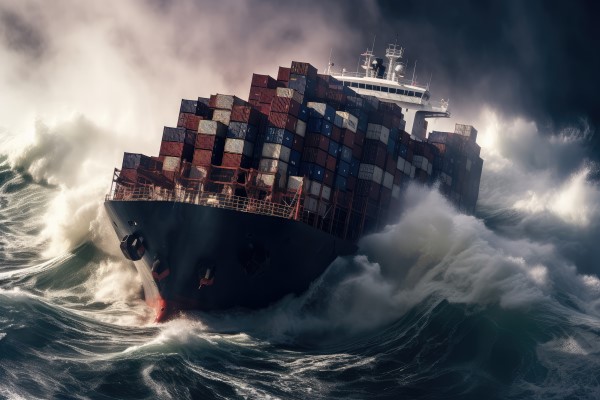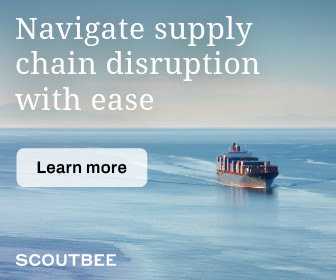Navigating the Red Sea Crisis: Impacts on Global Trade and Solutions for Procurement
Sponsored Content

The Red Sea crisis, marked by intensified attacks on container vessels by Iran-backed Houthi militants, has cast a shadow over one of the world’s most critical trade routes. With shipping giant Maersk cautioning that the disruption could persist for up to a year, the ramifications are currently reverberating across global supply chains.
The impact of these attacks extends beyond the immediate security concerns. Delays and additional costs incurred by shipping companies are rippling through various industries, raising fears of impending price hikes for consumers already grappling with inflationary pressures.
Richard Meade, editor-in-chief of shipping publication Lloyd’s List, notes an “almost wholesale exodus” of larger container ships from the Red Sea and Suez Canal, vital conduits facilitating 10 percent to 15 percent of world trade and 30 percent of global container shipping volumes. Such rerouting, albeit necessary for safety, entails significant detours, prolonging transit times by weeks and inflating operational expenses.
According to Peter Sand, chief analyst at Xeneta, an ocean and air freight data firm, approximately 90 percent of usual container ship capacity passing through the Red Sea and Suez Canal has been redirected around the southern tip of Africa. This diversion, while mitigating security risks, escalates fuel and insurance costs, charter fees, and wage bills. Sand estimates an additional US$1 million expenditure per vessel for circumnavigating Africa, predominantly attributed to heightened fuel expenses.
Consequently, shipping companies have raised freight rates and imposed emergency surcharges, escalating global shipping costs by 90 percent compared to the previous year. For instance, the cost of transporting a typical 40-foot container from Shanghai to Rotterdam has surged by 158 percent year-on-year, reaching $4,426.
The repercussions are being felt across industries. Tesla has paused production due to delays in receiving essential components, while Ikea warns of potential product shortages. Moreover, there’s evidence suggesting a shift towards airfreight as an alternative to sea transport, particularly for time-sensitive goods like apparel, resulting in exorbitant costs, as well as being detrimental to the environment.
Despite these challenges, it’s crucial to acknowledge that the current crisis is less severe than the coronavirus pandemic-induced disruptions of recent years. Simon MacAdam, deputy chief global economist at Capital Economics, highlights that while global demand for goods soared in 2021, it has since normalized. Moreover, increased vessel capacity and sustained oil production have tempered freight costs.
However, the threat of inflation looms. Higher freight expenses may prompt retailers, particularly those with narrower profit margins, to pass on costs to consumers. The Organisation for Economic Co-operation and Development forecasts a potential 0.4-percentage point increase in consumer price inflation across member countries if freight costs remain elevated.
Amidst these challenges, procurement professionals face the daunting task of navigating volatile supply chains to ensure business continuity. Here, innovative solutions like Scoutbee’s artificial intelligence (AI)-powered supplier discovery platform offer hope. By leveraging advanced algorithms and natural language processing, Scoutbee enables procurement teams to identify and evaluate new suppliers quickly and efficiently.
Traditionally, supplier discovery has been laborious and time-intensive. However, Scoutbee streamlines this process, enabling procurement professionals to discover potential suppliers based on specific criteria such as location, capabilities and diversity/sustainability status. Moreover, Scoutbee’s AI continuously monitors the market landscape, alerting users to emerging suppliers and market trends, thereby fostering agility and adaptability.
In the face of disruptions like the Red Sea crisis, Scoutbee’s platform becomes an indispensable tool. By providing access to a diverse pool of suppliers and facilitating informed decision making, Scoutbee empowers procurement professionals to mitigate risks, optimize supply chains, and navigate turbulent waters — figurative and literal — with confidence.
While the Red Sea crisis poses formidable challenges to global trade, it also underscores the importance of resilience and innovation in supply management. By embracing technologies like Scoutbee’s AI-powered supplier discovery platform, procurement professionals can turn adversity into opportunity, driving efficiency, agility, and sustainability in their operations.
Contact Scoutbee’s sales team today for a demo. And those at ISM World 2024 in Las Vegas are welcome to stop by our booth (P-T4) and meet us in person.



